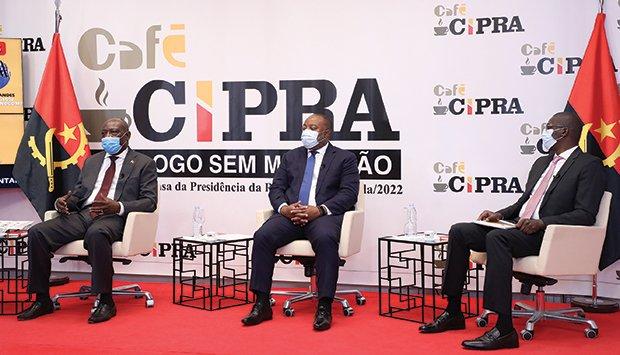Africa-Press – Angola. The Strategic Food Reserve (REA) has a stock of over 200 thousand tons, enough for a period of up to six months of consumption, as well as to regulate the market and influence the drop in food prices in the basic basket.
These data were revealed, on Friday, in Luanda, by the REA coordinator, Eduardo Machado, during the second CaféCIPRA, held under the theme of “Fostering national production and the sustainability of the Strategic Food Reserve”, also counting on the interventions by the ministers of Agriculture and Fisheries, António Assis, and Industry and Commerce, Victor Fernandes. Eduardo Machado said that 70,000 tonnes of rice, 88,000 tonnes of corn, 6,000 tonnes of soy, 80,000 tonnes of sugar and 3 700 tons of chicken.
The source added that the storage capacity for food products in the Luanda and Benguela warehouses is exhausted, with which the Food Reserve fulfills the potential to complement the market supply.
“Market operators should not be afraid of the Food Reserve, as it exists to help them eliminate unfair competition and unconfessed practices from commercial activity”, declared the manager.
Regarding the sustainability of the REA, he clarified that it has no connection with the volatility of the price of oil, nor has recourse been made to the General State Budget (OGE).
“We have a comfort from the Treasury in the Ministry of Finance, but it is the market that is essentially financing the ‘stock’ of the Reserve”, he observed.
stimulate production
REA, he noted, has the potential to leverage the productive capacity of the Angolan agro-industrial sector, with national production tending to be prioritized over the import of processed foodstuffs.
Stabilization of prices and guarantee of supply of basic basket goods at non-speculative prices to the domestic market, ensure a permanent physical stock of essential foodstuffs in case of national emergency, guarantee the gradual replacement of imports by the supply of national production, as well as how to mitigate risks and impacts of volatility in international agri-food markets are also part of the project’s motivations.
Eduardo Machado said that agricultural promotion within the scope of the REA, underlies the immediate implementation of an articulation and leverage of programs such as the Integrated Plan for Acceleration of Family Agriculture and Fishing (PIAAPF) and the Program to Support Production, Diversification of Exports and Substitution of Imports (PRODESI).
The program, he specified, comprises a component of private rural extension and the promotion of family and commercial agriculture, with actions to focus on social and productive monitoring, as well as on the transfer of resources (including financial) reimbursable to families, for investment in productive processes.
The strategy, he added, comprises a first experimental moment with two implementation periods, namely the period between March to April 2022 and August to September of the same year.
For this last period, the program aims to encourage and train, in articulation with the Ministries of Agriculture and Fisheries and of Economy and Planning, about 52 thousand families and a still unidentified number of commercial farmers, through the supply of kits for agricultural support that includes fertilizers, seeds, pesticides and sprays, aimed at improving the production process and increasing crops.
It also comprises the negotiation and future purchase, under competitive conditions, of the entire surplus of family and commercial production promoted under this program.
In the light of institutional decisions, the REA also plays a fundamental role in ensuring the supply and access to fertilizers on credit, as well as guaranteeing the purchase of surpluses from family and commercial production within the scope of the production promotion program. national.
Government anticipation
The Minister of Industry and Commerce considered that, with the constitution of such important reserves, something that, at a certain time, took place at an accelerated pace, the Executive anticipated the effects of the conflict in Ukraine on the drop in supply and the increase in prices. of essential goods. “We do not have the ability to predict how long the war will last, but we must look at the scenario and understand the implications in terms of food production”, he underlined.
The minister considers that, despite the conflict involving two global producing countries at the top of the wheat chain, the world will not stop producing this raw material, with upward pressure on prices expected, followed by a period of stabilization.
For More News And Analysis About Angola Follow Africa-Press






